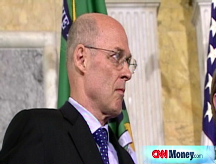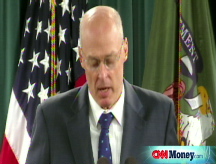Oil settles lower for first time in a week
Crude futures drop as investors await more developments in the proposed $700 billion bailout and refocus on lackluster demand.

NEW YORK (CNNMoney.com) -- Oil prices declined Tuesday as investors refocused on how the struggling economy thwarts demand for energy and wait for more developments concerning the government's proposed $700 billion bailout plan.
Oil slipped $2.76 to settle at $106.61 a barrel, having fallen as low as $104.05 earlier in the session. The November contract, which became the front-month contract Tuesday, settled up $6.62 to $109.37 on Monday.
It was the first time oil settled lower since last Tuesday, when oil sank as far as $90.51 in trading.
Since then, oil has rallied, gaining back more than $16 as the financial crisis sent the dollar plummeting.
On Monday, prices rose as high as $130 in intraday trading as the October contract drew to a close with the biggest one-day price spike ever, $16.37.
But a rebound in the dollar Tuesday pressured oil prices. "The dollar, which just got wrecked yesterday, has bounced backed today," said James Cordier, portfolio manager of OptionSellers.com.
Because crude oil is traded in U.S. currency across the globe, the stronger dollar pushes oil prices down.
The market also refocused on the idea that a weak economy does not have a healthy appetite for oil.
"The bailout is [coming] because the economy is so incredibly weak," said Cordier, and a staggering economy desperate for a lifeline, won't be guzzling energy in the very near term.
Another analyst echoed the sentiment. "It looks like we are back to the situation where we are trying to get a handle on the overall macro situation" said Brian Hicks, portfolio manager for the Global Resources Fund.
A large drop in crude prices would be cause for concern in another era of the oil market. "The only constant has been the volatility in the last couple days," said Hicks.
The oil market moved in leaps and bounds because of limited participation in the market, according to Hicks.
"There is a lot of indecision and so we are seeing relatively light volumes," he said. "It is because of these light volumes we are able to see dramatic volatility one way or the other."
Demand: The bailout could support the economy and help demand for energy recover in the long term, said Cordier, but in the shorter term, the prospect of such a overarching move points to just how weak the economy really is.
"On the one hand, a bailout of this magnitude can be inflationary," which would push oil prices higher, he said. "On the other hand, it shows the incredible dire straits of the economy."
"We will be in a tug of war," said Cordier, as the oil market waits to hear from Congress and then watches to see how the economy reacts to the bailout, if it is indeed passed.
Right now, "the economy is in such a weak position that demand is considered lethargic at best," said Cordier. As demand for energy has fallen off, oil prices have come off the record high price of $147.27 hit on July 11.
$700 billion bailout: On Saturday, President Bush asked Congress for the authority to spend as much as $700 billion to purchase toxic mortgage debt from already struggling financial institutions in an effort to prevent the credit crisis from crippling an already beleaguered Wall Street.
Investors had hoped that the bailout plan would put the nation's economy on the fast track to recovery, helping demand for energy tick higher as well.
However, the unprecedented scope of the plan in combination with a lack of details as to how the plan will actually work left the stock market anxious on Monday, and the Dow ended the day 373 points lower. The stock market was hesitant on Tuesday as well, waiting for further information.
"There is still some fear about the bailout package because it is still in the hands of Congress," said Tom Orr, director of research at Weeden & Co., financial services firm. "People are worried that there will have to be compromising to be made and there will be delays."
"Time is a problem. Time is not on your side. It needs to be expeditious," added Orr. "Every day there is a delay, there is the risk that some other landmine goes off. People need the comfort to know that this package is in place."
Treasury Secretary Henry Paulson and Federal Reserve Chairman Ben Bernanke both said Tuesday that the measures outlined for the bailout were urgently necessary.
One analyst said that if the Congress does actually pass the bailout, it would likely push oil prices higher very quickly.
The bailout "may get the motor running but because of the influx of so much money. They are adding liquidity to the system to the tune of $700 billion," said Mark Waggoner, president of Excel Futures.
But, "adding that much liquidity to the market essentially dilutes the dollar - makes the value lower," said Waggoner. And because crude oil is traded in U.S. currency globally, a weaker dollar pushed crude prices sharply higher.
After the spike: The November contract's substantial $6 gain on Monday was overshadowed by the historic $16 surge in the October contract. Monday was the last day that the October contract was the front-month contract, and oil posted the largest one-day gain in dollar terms ever, settling up $16.37 at $120.92 a barrel.
Oil had risen as much as $25 to touch $130 a barrel. The late-session spike was due to investors having to make good on their orders before the October contract expired.
The $6.62 increase in the November contract Monday would be considered a substantial move, except for its comparison with the unprecedented move in the October contract.
"The market is resetting itself," said Orr, of the moderate trading Tuesday.
The spike in price on Monday "was completely aberrational. It was not indicative of what was going on in the market - it was only indicative of what was going on with the front month contract," said Orr.
"People waited until the last half hour of the day and there were absolutely no sellers," said Orr. "You don't have any market makers since Wall Street is in such disarray."
In response to the unprecedented runup in oil futures, the Commodity Futures Trading Commission (CFTC) said in a statement that it was investigating the situation to be sure that there was no mishandling of the oil trade.
"No one should be trying to game our nation's commodity futures markets," said CFTC Acting Chairman Walter Lukken in a written statement.
Supply concerns: Lower oil prices defied several ongoing supply disruptions, which would normally cause oil prices to rally.
"Right now, we are not in a supply-driven market," said Cordier. "It is all about demand and people are trying to gauge this right now."
Violence in oil-rich Nigeria has been limiting crude supplies out of the country. The Movement for the Emancipation of the Niger Delta (MEND) has been attacking oil pipelines in retaliation against government forces, limiting the amount of crude oil that can leave the country.
In addition, the Gulf of Mexico was still struggling to regain footing after Hurricanes Gustav and Ike shook the oil production and refinery-rich region.
According to the most recent situation report from the Department of Energy, 76.6% of oil production in the region remained shut in and 65.5% of natural gas production was still shuttered. With 6 refineries in Texas still shut down, nearly 1.7 million barrels per day less oil have been processed in the region, according to the DOE.
Russian warships have sailed for Venezuela, and that would also typically support oil prices, according to Waggoner. After the Russia-Georgia conflict last month, two Russian bombers were deployed to Venezuela as tensions with the United States mounted. Both Venezuela and Russia have large supplies of oil.
According to Waggoner, the oil market will also be keeping an eye on the area in the Atlantic Ocean which the National Hurricane Center reports "has the potential to become a tropical depression at any time." ![]()








